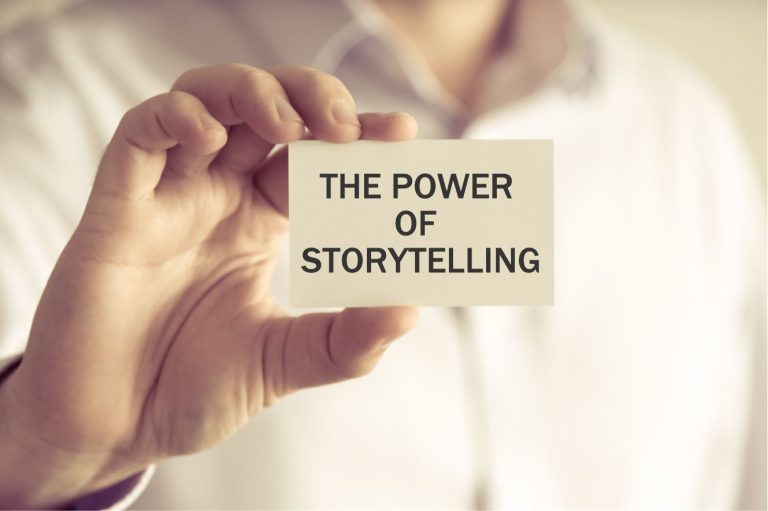Why is Storytelling Powerful?
Storytelling is powerful because it engages emotions and creates a connection between the storyteller and the audience, making the message more memorable and impactful. Storytelling has always been a fundamental aspect of human communication, dating back to ancient times when stories were shared through oral traditions.
It is the art of crafting narratives that captivate and inspire. Stories have a unique ability to transport us to different worlds, evoke emotions, and make complex concepts relatable. When we hear a story, our brains become immersed in the narrative, triggering empathy and activating various sensory and emotional responses.
This engagement and emotional connection make storytelling a powerful tool for communication, whether it be in marketing, education, or simply sharing personal experiences. We will explore the reasons why storytelling is so powerful and why it continues to be a vital part of human culture.
The Human Connection: Unleashing The Emotive Potential Of Stories
Discover the true power of storytelling in ‘The Human Connection: Unleashing the Emotive Potential of Stories’. Unveiling the captivating ability of narratives to deeply resonate with people, this exploration delves into why storytelling is an immensely powerful tool.
Stories As A Universal Language
- Stories have been used throughout history as a means of communication, transcending cultural and linguistic barriers.
- They are a universal language that connects people from different backgrounds and experiences.
- Stories allow us to share and understand complex ideas, emotions, and values in a relatable and accessible manner.
Evoking Empathy And Emotional Engagement
- Stories have the power to evoke empathy by immersing audiences in the experiences of others.
- They allow readers to step into the shoes of characters, gaining insight into their joys, struggles, and emotions.
- Through this emotional engagement, storytelling fosters empathy, understanding, and connection among individuals.
Creating Lasting Impressions
- Stories have a lasting impact on our memories and perceptions.
- When information is presented in a story format, it becomes more memorable and easier to recall.
- Stories have the ability to leave a deep impression on the reader, influencing their thoughts, beliefs, and actions long after the story has been read.
By using stories as a universal language, storytelling unleashes the emotive potential of connecting people from different backgrounds and experiences, evoking empathy and emotional engagement, and creating lasting impressions that shape our thoughts and actions.
The Neurochemistry Of Stories: How Narrative Influences The Brain
Discover the captivating power of storytelling and its impact on the brain, as we delve into the fascinating field of neurochemistry. Uncover why narratives hold such sway over our emotions, thoughts, and experiences.
Storytelling has been a fundamental part of human culture since the beginning of time. The captivating power of stories lies in their ability to engage our minds and evoke intense emotions. But have you ever wondered why storytelling is so powerful?
Today, we will explore the fascinating science behind engaging stories and how narrative influences the brain.
The Science Behind Engaging Stories
- Stories capture our attention and transport us to different worlds, allowing us to escape reality momentarily.
- Engaging stories activate various regions of the brain, resulting in a memorable and immersive experience.
- The neurochemistry of storytelling involves the interplay of mirror neurons and the release of dopamine, which significantly impact our perception and cognition.
Activating Mirror Neurons: Putting Yourself In Someone Else’S Shoes
- Mirror neurons are a unique class of brain cells that fire both when we perform an action and when we observe someone else performing the same action.
- When we listen to or read a story, these mirror neurons enable us to mentally simulate the experiences and emotions of the characters, as if we are living their lives ourselves.
- This phenomenon creates a strong sense of empathy, allowing us to connect with the story on a deeper level.
The Impact Of Dopamine Release On Attention And Memory
- Dopamine, a neurotransmitter associated with pleasure and reward, plays a crucial role in the brain’s response to storytelling.
- Engaging narratives trigger the release of dopamine, enhancing our attention and motivation to continue the story.
- This surge in dopamine also strengthens the encoding of information into memory, making it easier for us to recall details of the story later on.
The science behind captivating storytelling lies in the complex workings of our brain. By activating mirror neurons and triggering the release of dopamine, narratives have the ability to engage our minds, create empathy, and enhance our memory. Understanding the neurochemistry of stories can help us harness the power of storytelling to influence and connect with others on a deeper level.
So, the next time you find yourself captivated by a story, remember that it’s not just your imagination at play – it’s the incredible science behind the art of storytelling.
Stories That Drive Change: Persuasion And Influence
Discover the transformative power of storytelling in driving change and influencing others. Explore the captivating ability of stories to engage, inspire, and persuade, making them a potent tool for creating impact and effecting positive change.
The Art Of Persuasive Storytelling
Storytelling has been an integral part of human communication for centuries. From ancient myths to modern-day novels, stories captivate our attention and evoke emotions. But storytelling is not just about entertainment; it also holds immense power in driving change. Here, we will explore the art of persuasive storytelling and how it can influence and persuade individuals and communities.
- Inspiring Actions and Shaping Opinions:
- Stories have a unique ability to inspire action and shape opinions. When a story is well-crafted, it can move people emotionally, leading them to take desired actions or form new beliefs.
- By appealing to our emotions, stories can motivate us to make positive changes in our lives. They can activate empathy within us, enabling us to connect with others and understand their experiences. This connection helps foster a sense of commonality and drives us to take action.
- Moreover, stories have the power to challenge existing beliefs and perspectives. They can introduce new ideas subtly, which can be more persuasive than direct arguments or facts. Through storytelling, complex concepts can be simplified, making them more accessible and relatable to a wider audience.
The Role Of Stories In Driving Social Change
Stories have played a significant role in driving social change throughout history. They have been used as a powerful tool to spur collective action and promote social justice. Here’s a closer look at the impact of stories in driving social change:
- Spreading Awareness and Generating Empathy:
- Stories have the ability to shine a light on social issues that may be overlooked or misunderstood. By sharing personal narratives and experiences, stories have the power to educate and raise awareness among individuals and communities.
- When we hear stories that depict the struggles and triumphs of others, we develop a deeper understanding of their experiences. This understanding, in turn, generates empathy and helps break down barriers and prejudices.
- Mobilizing Individuals and Communities:
- Stories have the potential to mobilize individuals and communities towards a common goal. Through relatable characters and compelling narratives, stories can create a sense of urgency and inspire people to take collective action.
- By highlighting the real-world impact of social issues, stories galvanize individuals to step out of their comfort zones and become advocates for change. They can motivate people to join movements, donate to causes, or volunteer their time to make a difference.
- Bringing Marginalized Voices to the Forefront:
- Stories have long been a platform for marginalized voices to be heard, recognized, and empowered. They can provide a platform for individuals who are often silenced, amplifying their stories and fostering inclusivity.
- By sharing diverse perspectives, stories challenge societal norms and promote understanding and acceptance. They pave the way for change by dismantling stereotypes and advocating for a more equitable and just society.
Storytelling is a powerful tool that can shape society, transform attitudes, and spur positive change. Through the art of persuasive storytelling, we can inspire action, reshape opinions, and drive social change for a better future. So let us harness the power of stories and use them to create a world where everyone’s voices are heard and valued.
Stories In Business: Building Brand Identity And Customer Loyalty
Discover the power of storytelling in building brand identity and customer loyalty with “Stories in Business. ” Unleash the potential of connecting with your audience through captivating narratives that resonate and leave a lasting impact. Explore the art of storytelling and harness its influence on your business success.
Storytelling is a powerful tool that has been used throughout history to captivate and connect with audiences on a deep, emotional level. In the realm of business, storytelling plays a crucial role in building brand identity and fostering customer loyalty.
By crafting a brand narrative that resonates with consumers, businesses can establish trust, authenticity, and an emotional connection that sets them apart from their competitors. Let’s explore how stories in business can help to achieve these objectives.
Crafting A Brand Narrative That Resonates:
- Stories provide an opportunity for businesses to convey their values, mission, and purpose in a compelling and relatable way.
- By creating a central narrative that ties together the various aspects of a brand, businesses can engage their target audience and leave a lasting impression.
- A well-crafted brand narrative helps to establish a unique identity in the minds of consumers, making the brand more memorable and recognizable.
- Brands can use storytelling to showcase their journey, highlighting milestones, challenges, and triumphs that resonate with their audience.
- Through stories, businesses can humanize their brand, making it more relatable and connecting on a personal level with their customers.
Building Trust And Authenticity:
- Stories have the power to build trust by providing a transparent and authentic view into the brand’s ethos and values.
- When businesses share stories about their origins, the people behind their products or services, and their commitment to quality, customers can develop a sense of trust and loyalty.
- By demonstrating transparency and authenticity through stories, businesses can build credibility, which is essential in establishing long-term customer relationships.
- Genuine storytelling allows customers to understand the values and ethics of the brand, making them more likely to trust and support the business.
Fostering Customer Loyalty Through Emotional Connection:
- Stories elicit emotions, and emotional connections are key to fostering customer loyalty.
- When businesses share stories that resonate with their audience on an emotional level, they create a bond that goes beyond transactional relationships.
- By tapping into emotions such as joy, empathy, or inspiration, storytelling can create memorable experiences for customers, enhancing their loyalty to the brand.
- When customers feel emotionally connected to a brand, they are more likely to become brand advocates and recommend the business to others.
- Stories that evoke positive emotions and align with customers’ values can strengthen the bond between customers and the brand.
Storytelling in business plays a critical role in building brand identity and cultivating customer loyalty. By crafting a brand narrative that resonates, businesses can create a sense of trust, authenticity, and emotional connection with their audience. Through storytelling, businesses can set themselves apart from competitors and build long-lasting relationships with customers based on shared values and experiences.
The Psychological Power Of Storytelling: Healing And Transformation
Unlock the transformative power of storytelling in healing the mind and soul. Discover how stories connect and resonate with us on a psychological level, offering profound insights and emotional release for both the listener and the storyteller. Experience the captivating force that storytelling holds in shaping our perspectives and fostering personal growth.
Storytelling holds a tremendous power that goes beyond mere entertainment. It has the ability to captivate our minds, touch our hearts, and even transform our lives. In this section, we will explore the psychological power of storytelling, specifically focusing on its therapeutic effects and the healing and transformative experiences it can provide.
Therapeutic Effects And The Cathartic Nature Of Stories:
- Stories have a unique way of allowing us to step into different worlds and perspectives, providing an escape from our own reality.
- By immersing ourselves in the lives of fictional characters, we are able to explore complex emotions and experiences in a safe and controlled environment.
- This process of emotional engagement and identification can be cathartic, allowing us to release and process our own unresolved emotions, traumas, and challenges.
- Through storytelling, we can gain a sense of validation and understanding, realizing that we are not alone in our struggles.
- It offers a therapeutic outlet for emotional expression and can aid in stress reduction, relaxation, and emotional healing.
- The narrative structure of stories helps us make sense of our own experiences, providing a framework for understanding and processing life’s challenges.
Stories As Tools For Self-Reflection And Personal Growth:
- Narratives often contain lessons and moral values that can inspire personal growth and self-reflection.
- By observing characters’ journeys, we can gain insights into different perspectives and develop empathy and compassion.
- Stories invite us to reflect on our own actions and choices, prompting us to consider alternative paths and examine our beliefs and values.
- They can spark introspection, challenging us to question our prejudices, biases, and assumptions.
- Through the identification with and observation of characters’ transformations, we can find inspiration to embark on our own personal growth journeys.
The Healing Power Of Sharing Experiences:
- Sharing our own stories and experiences can be a powerful tool for healing and connecting with others.
- It creates opportunities for empathy, support, and understanding from both ourselves and our audience.
- When we open up about our challenges and triumphs, we create a sense of community and belonging.
- Our stories can inspire and resonate with others, offering hope and encouragement.
- By sharing our experiences, we not only heal ourselves but also contribute to the collective healing of society.
Storytelling possesses a psychological power that can facilitate healing, personal growth, and transformation. Through its therapeutic effects, capacity for self-reflection, and ability to connect individuals, storytelling offers us a powerful and accessible medium for exploring the depths of the human experience.
So next time you find yourself engrossed in a captivating story, remember the immense potential it holds for healing and personal growth. Share your own stories, embrace the stories of others, and let the power of storytelling guide you on a journey of healing and transformation.

Credit: ideas.ted.com
Empowering Communities: Stories That Unite And Bring Change
Discover the power of storytelling in empowering communities, uniting people, and driving meaningful change. These stories have the ability to captivate the audience, evoke emotions, and inspire action, making them a powerful tool for connecting individuals and fostering positive transformations.
Storytelling has always been a powerful tool, capable of captivating individuals and inspiring change. One of the remarkable aspects of storytelling lies in its ability to empower communities, fostering unity and transformation. Through sharing narratives and experiences, stories create a space for empathy, challenge stereotypes, break barriers, amplify voices, and foster social cohesion.
Let’s delve deeper into the ways storytelling empowers communities:
Stories As Catalysts For Empathy And Understanding
- Encourages empathy: Stories have a unique ability to evoke emotions and bridge the gap between different individuals. By immersing ourselves in compelling narratives, we can better understand the experiences and perspectives of others.
- Builds bridges across divides: Storytelling facilitates connections between people from diverse backgrounds, creating a shared sense of humanity. Through storytelling, barriers based on race, gender, religion, or socioeconomic status can be broken down.
- Inspires dialogue and conversation: Sharing stories encourages open discussions, allowing for healthy exchanges of ideas and encouraging mutual understanding.
Challenging Stereotypes And Breaking Barriers
- Challenges preconceived notions: Stories have the power to challenge stereotypes. Through authentic portrayals of diverse characters and experiences, storytelling can disrupt biases and broaden our perspectives.
- Breaks down societal barriers: By amplifying stories of marginalized communities, storytelling helps break down the walls of silence and exclusion. It enables individuals to step outside their comfort zones and confront the systemic barriers that perpetuate inequality.
Amplifying Voices And Fostering Social Cohesion
- Amplifies marginalized voices: Stories have the potential to give voice to communities that have historically been silenced and overlooked. By sharing their narratives, storytelling empowers individuals to reclaim their identities, challenge injustice, and demand change.
- Fosters social cohesion: The act of storytelling creates a sense of belonging and community. When individuals feel heard and valued through storytelling, it fosters social cohesion and strengthens bonds among community members.
In essence, storytelling is a catalyst for positive change within communities. Through its power to empathize, challenge, and amplify voices, storytelling empowers individuals and unites communities, ultimately paving the way for a more inclusive and equitable society.
Frequently Asked Questions Of Why Is Storytelling Powerful?
Why Is Storytelling So Important?
Storytelling is important because it engages, captivates, and connects with audiences on a deeper level, making information more memorable.
What Is The Power Of Storytelling?
Storytelling has the power to captivate, engage, and inspire people. It connects on an emotional level, making messages more memorable and relatable.
What Are 3 Benefits Of Story Telling?
Storytelling has 3 benefits: engages audiences, creates emotional connections, and enhances understanding.
What Makes Storytelling So Powerful?
Storytelling is powerful because it captivates audiences by connecting on an emotional level, making information more memorable. It creates a narrative structure that engages listeners or readers, making them more likely to remember and relate to the message being conveyed.
Conclusion
Through the ages, storytelling has proven to be a powerful tool for communication, connection, and understanding. It allows us to convey complex ideas in a relatable and engaging way, capturing our attention and leaving a lasting impact. Stories have the ability to evoke emotions, spark imagination, and create a sense of empathy among readers or listeners.
By incorporating storytelling techniques into our content, we can captivate our audience, increase their engagement, and ultimately drive conversions. The power of storytelling lies in its ability to establish a connection and build trust with our audience. It enables us to communicate our brand’s message effectively, making it more memorable and relatable.
So, whether you’re crafting a blog post, designing a marketing campaign, or delivering a presentation, don’t underestimate the power of storytelling. Embrace it, and watch as your content achieves its full potential in capturing hearts and minds.


